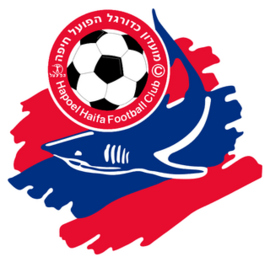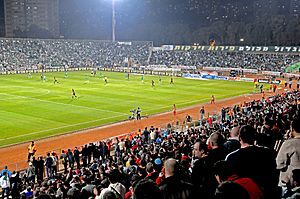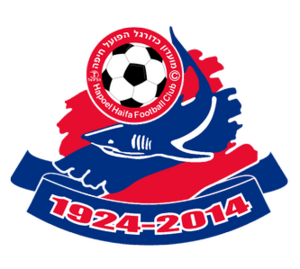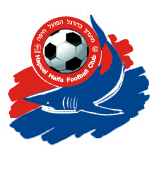Hapoel Haifa F.C. facts for kids
 |
||||
| Full name | Hapoel Haifa Football Club | |||
|---|---|---|---|---|
| Nickname(s) | The Sharks | |||
| Founded | 24 April 1924 | |||
| Ground | Sammy Ofer Stadium, Haifa, Israel | |||
| Capacity | 30,942 | |||
| Owner | Yoav Katz | |||
| Manager | Gal Arel | |||
| League | Israeli Premier League | |||
| 2021–22 | Israeli Premier League, 11th of 14 | |||
|
||||
Hapoel Haifa Football Club (Hebrew: מועדון הכדורגל הפועל חיפה, Moadon HaKaduregel Hapoel Haifa) is a professional football team from the city of Haifa, Israel. The club is often called "The Sharks" by its fans.
Hapoel Haifa has won one national championship in the 1998–99 season. They have also won the Israel State Cup four times: in 1962–63, 1965–66, 1973–74, and 2017–18.
The team plays its home games at the Sammy Ofer Stadium in Haifa. They moved to this stadium in 2014. It is a large stadium, holding 30,942 people, and they share it with their city rivals, Maccabi Haifa. Hapoel Haifa's home uniform is all red. Their away uniform has white shirts with black shorts and socks.
Contents
Club History
The Early Years: Starting a Team
Hapoel Haifa began in 1924 as part of a local sports group in what is now Israel. This group wanted to create the first football club for workers in the area. On April 24, 1924, a meeting took place in Haifa with 36 people to officially start the club.
Their very first match was on May 1, 1924, which is Labor Day. Hapoel Haifa won 3–1 against a team of train workers from Haifa. In the early days, the club mostly played friendly matches against teams from different countries. This was because the Israel Football Association had not been formed yet, so there were no official league games.
At first, Hapoel Haifa was part of the Maccabi sports group. But two years later, they decided to leave and helped create a new sports group called Hapoel.
In 1928, the Israel Football Association (IFA) was created, and official matches began. For the first four years, only cup matches were played, and then league matches were added. Hapoel Haifa was one of the top teams in the country, even though they didn't win many trophies at first.
In 1932, the team reached its first cup final against the British Police. The referee made some controversial decisions. When Hapoel Haifa was leading 1–0, one of their players took the cup in protest. Because of this, Hapoel Haifa was disqualified from the match. That year, five players from Hapoel Haifa were chosen to play for the Palestine national team.
The Fifties: Returning to Action
After a break due to the 1947–1949 Palestine war, the Israeli League started again in 1950. Hapoel Haifa finished in third place that season. Two years later, cup matches also restarted. During these years, the team continued to be one of the leading clubs, but they still didn't win any major trophies.
The Sixties and Seventies: A Golden Age
In the early 1960s, Hapoel Haifa was struggling. In the 1962–63 season, they were almost relegated to the second division. However, due to issues with other matches, no teams were relegated that year. This was a turning point for the club. Many talented young players from their youth team joined the main squad, and the team started to play much better.
In that same 1962–63 season, Hapoel Haifa won the Israel State Cup for the first time! They beat their rivals Maccabi Haifa 1–0 in the final. After this, the team consistently finished in the top part of the league and reached the cup final three more times. Key players during this successful period included Abba Gindin, Yitzhak Englander, Yochanan Vollach, and Roby Young. These players were some of the best in Israeli football and played for the Israel national team for many years. Roby Young even became the captain of the national team.
In 1974, Hapoel Haifa won the Israeli Cup again. However, around this time, some of the club's best players started to leave, including Englander and Vollach, who moved to Maccabi Haifa. This happened because of problems with Hapoel's management. Even though the team finished second in 1975, a difficult period began, leading to big challenges in the 1980s.
The Eighties: A Difficult Time
In 1981, Hapoel Haifa was relegated to the second division for the very first time. Before this, they were one of only three clubs that had never been relegated. This marked the start of the toughest decade in the club's history. Even bringing in Peter Lorimer, a famous player from Leeds United, as manager didn't help much, and he left after a few months.
The club faced serious money problems and was almost bankrupt. There were also many changes in leadership. Towards the end of the 1980s, three former players, Yitzhak Englander, Avi Kaufman, and Efraim Gabay, tried to help save the club. But without enough money, they couldn't solve the financial crisis.
The Nineties: The Shapira Era
In 1992, the team was promoted back to the first division. During this time, rumors spread about a secret businessman helping the club. This person turned out to be Robi Shapira, who had made his money in the fishing business. Shapira invested a lot of money into the club, saving it from financial ruin. He used the money to buy many top players. However, the team still struggled and was often in danger of being relegated.
After a series of losses in the 1993–94 season, Shapira decided to buy the club completely. In the first few years under Shapira, many great players and managers joined the team. Still, they couldn't win any trophies or achieve their big dream: winning the championship.
1998–99: Becoming Champions
In the 1997–98 season, Hapoel Haifa finished in third place with Eli Guttman as their manager. The next season, the team was seen as a good club, but not a top contender for the championship. However, they started winning many games and quickly moved into first place, building a big lead over other teams.
Hapoel Haifa played a very smart and effective style of football. On Saturday, May 8, 1999, in the 27th game of the league, Hapoel Haifa played against Maccabi Tel Aviv, who were in second place. Hapoel Haifa won the match 3–2 and were crowned champions for the first and only time in their history!
2000s to Today: Ups and Downs
After winning the championship, the team had a disappointing season, finishing seventh. Two important players left, and their replacements couldn't help the team repeat their success. The next season, manager Eli Guttman left, and new foreign players joined. The team finished in third place, winning both local derby matches against Maccabi Haifa.
In the summer of 2001, news spread that Robi Shapira was going to greatly reduce his funding for the club. It was later found out that Shapira was facing serious financial problems. On December 14, 2001, Shapira passed away unexpectedly. After his death, a court decided that Hapoel Haifa would be managed by temporary administrators. At the end of that season (2001–02), Hapoel Haifa was relegated to the second division. For almost three years, the club was managed by these administrators, who kept the team in the second division while looking for new owners.
In 2004, the club was bought by Yoav Katz, an Israeli businessman living in the United States. Hapoel Haifa played one season (2004–05) in the top league before being relegated again. They stayed in the second division until the end of the 2008–09 season, when they finished first and returned to the Israeli Premier League.
Since then, Hapoel Haifa has remained a well-known and respected club in the league. They haven't won many trophies recently, but they are known for helping foreign players develop and move on to bigger teams. In the 2005–06 season, the club's youth team won the youth league championship, showing they had one of the best youth teams in Israel.
European Competitions
Hapoel Haifa was the first Israeli team to reach the third qualifying round of the UEFA Champions League in 2000. They beat Beşiktaş from Turkey in the second qualifying round. Then, they lost to Valencia from Spain, who later reached the Champions League Final that year.
After losing to Valencia, Hapoel Haifa played against Club Brugge from Belgium in the UEFA Cup. Hapoel Haifa won the first match 3–1. In the second match in Belgium, Hapoel Haifa scored early. Even though Club Brugge scored more goals, Hapoel Haifa advanced to the next round because of the "away goals rule." This was the first time an Israeli team reached the second round of the UEFA Cup.
In the second round, Haifa played against Ajax from the Netherlands. Ajax won the first game in Israel 3–0. In the second game, Hapoel Haifa had an amazing 1–0 victory, but it wasn't enough to advance.
Stadium: Home of The Sharks

Hapoel Haifa used to play at Kiryat Haim, which is still their main training ground. In 1955, they received a gift from an Italian workers' union: a new football field in the center of Haifa. This became their new home stadium. The first game there was a Haifa derby, which Hapoel lost 4–1 to Maccabi.
The New Stadium: Sammy Ofer Stadium
The city of Haifa offered the club land for a new stadium at the southern entrance to the city. This led to the building of the Sammy Ofer Stadium. This modern stadium is now Hapoel Haifa's home, with 30,942 seats.
City Rivalry: Hapoel vs. Maccabi Haifa
The two main football clubs in Haifa, Hapoel Haifa and Maccabi Haifa, have a long and intense rivalry. This rivalry continued even when Hapoel Haifa was in the second division. The main reason for this rivalry was originally linked to the clubs' political backgrounds.
Hapoel was founded as a team connected to the socialist labor groups and was supported by the authorities. Because of this, Maccabi Haifa became known as the team that had to fight harder for its place. These differences also shaped the fans: Hapoel Haifa fans were traditionally linked to left-wing politics and were often workers from Haifa's industries. Maccabi Haifa fans were more often from the middle class.
In recent years, these political differences between the two fan groups have become less important. This is mainly because Maccabi Haifa has achieved a lot of success, which has made their fan base much larger and more diverse. However, there is still a slight difference between the two groups of fans. Many Hapoel fans live in the Krayot area. Today, the rivalry is mostly about sports, especially before derby matches.
Team Titles
League Championships
- Israeli Championships: 1 (1998–99)
Cup Competitions
- State Cup: 4 (1962–63, 1965–66, 1973–74, 2017–18)
- Toto Cup: 2 (2000–01, 2012–13)
- Israeli Super Cup: 1 (2018)
Current Coaching Staff
See also
 In Spanish: Hapoel Haifa Football Club para niños
In Spanish: Hapoel Haifa Football Club para niños
 | Isaac Myers |
 | D. Hamilton Jackson |
 | A. Philip Randolph |



